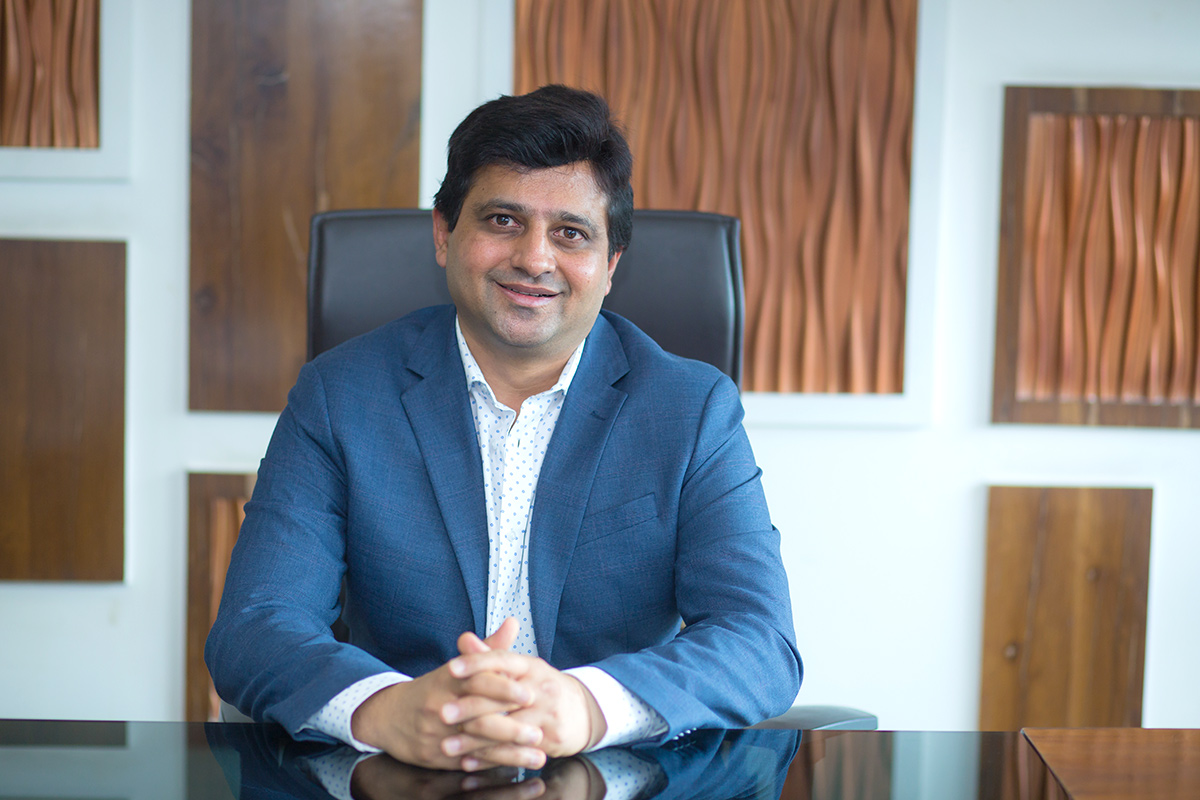
It’s happening in increments. It’s happening every day, and on an on-going basis. We’re living in an age where change is actually the only thing that’s constant.
Vivek Dugar is the Vice Chairman of the MV Dugar Group which primarily concentrates on three business verticals: Finance, Hydropower and Automobile. Vivek is the Chairman of Gurans Life Insurance in conjunction with being promoter of Sunrise Bank and Sanima General Insurance Co.
MV Dugar Group are the authorised distributors of Mahindra and Mahindra, TATA Hitachi, Royal Enfield, John Deere, Vespa Aprilia, Piaggio, MKG, Wirtgen Group, Mine Master, Leica Geosystems, Hyva, Kirloskar oil engines and JCB Hand Tools in Nepal. Under the Hydropower Division, they have Pan Himalaya Energy, Numbur Himalaya, Global Hydro Power and Nasa Hydropower projects. The financial sector sees them invested in Gurans Life Insurance, Sunrise Bank, Sanima General Insurance, and Manokamana Investment.
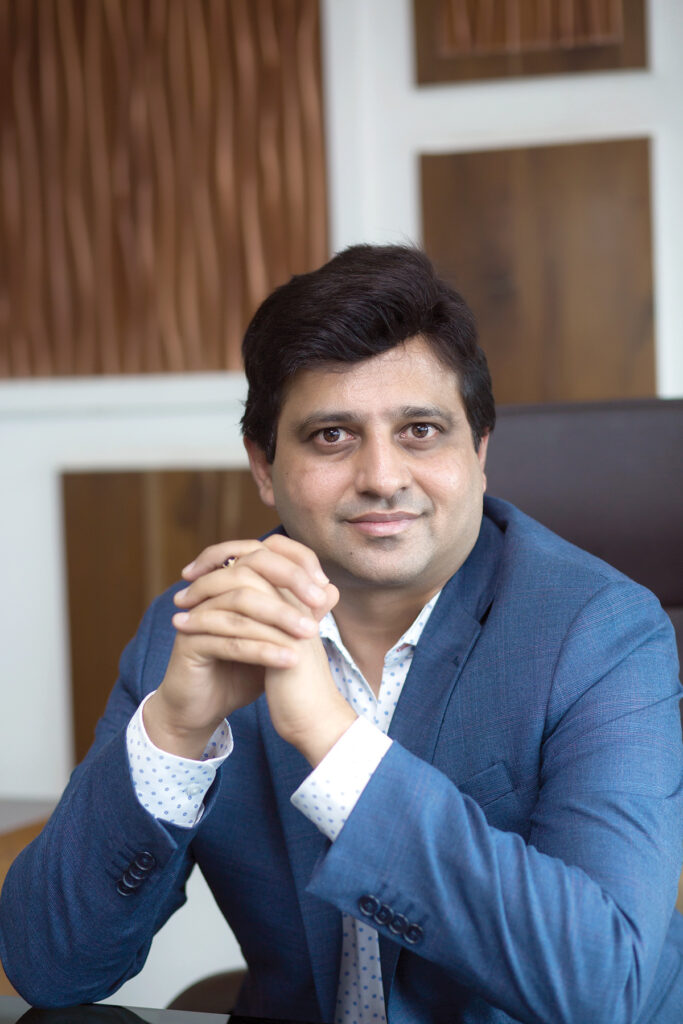
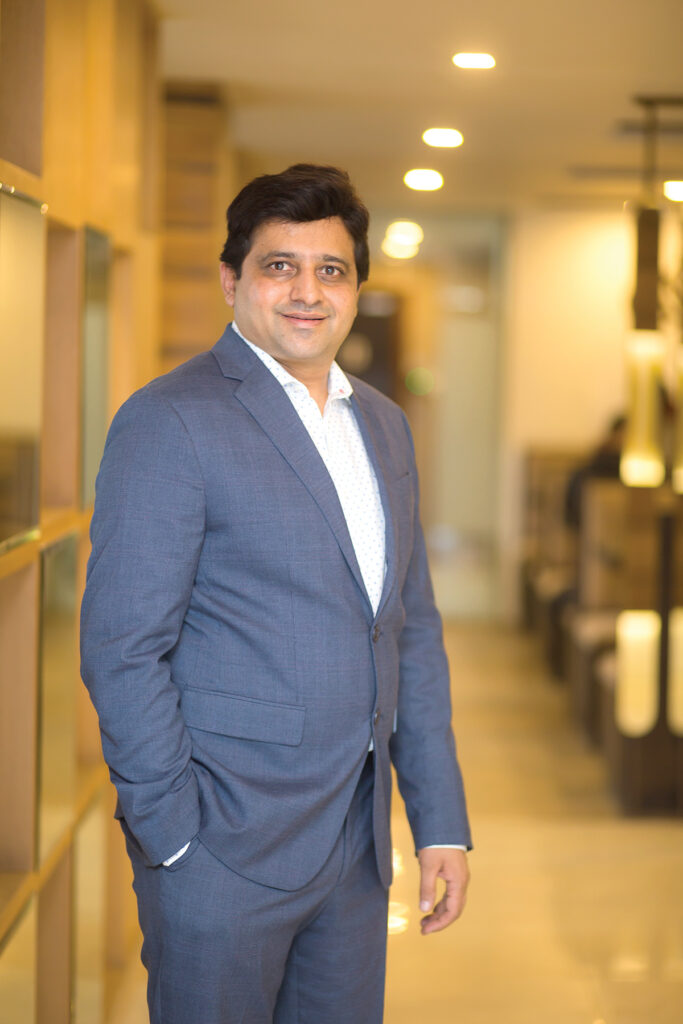
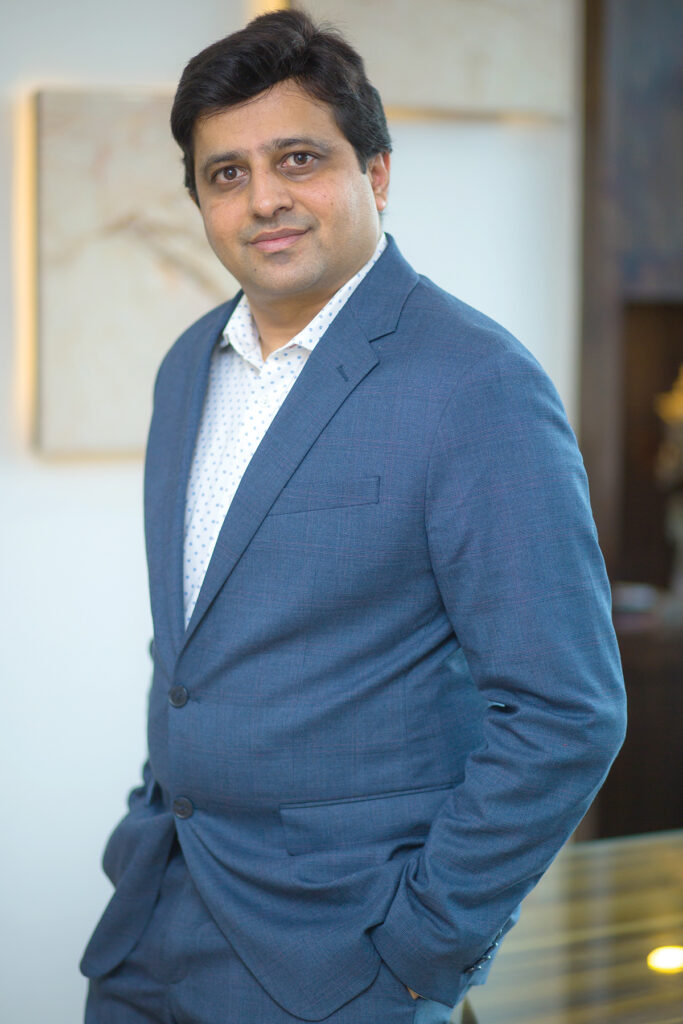
Beginnings
MV Dugar Group was established in 2016. “As happens in a joint family, ours also took the blow of disbandment,” states Vivek Dugar, Vice Chairman of the MV Dugar Group and son of Moti Lal Dugar. The latter had partnered with his eldest brother Tola Ram Dugar to form the TM Dugar Group. The two brothers had earlier separated from the original Dugar Group with a history that dates back to 137 years.A Glorious Past
The Dugars’ traditional business was in the food grain industry in Biratnagar. They owned rice and pulse mills with storing facilities all across Nepal. “We were the biggest processors for food grains in Nepal. Till today, one of my cousins is the biggest in the food grain segment. After the family partition, they are taking care of that business,” informs Vivek. “We were the first ones who introduced in Nepal ‘pay the farmers directly’ system. Back then they were not given cash for their produce directly. The farmers were exploited and were paid less than half of what the third party paid the sahukars for the produce. Also, we established our own collection depots,” he recalls. The sahukars were the middlemen who bought the produce from the farmers and sold it in the market. The farmers had to wait till the end of the year for their money. Of the four Dugar brothers, the eldest was Tola Ram who at merely 21 years of age suddenly found himself in the role of family head after their father passed away. The others were 18, 15 and Vivek’s father, the youngest was just 11 years old. It then fell upon the four brothers to run the family business. As time polished their business sensibilities, the brothers thought it wise to buy produce directly from the farmers with cash paid directly to them. But that required money. When the brothers approached Nepal Bank for a loan, they were awarded with on line of credit. “Moreover, my uncle was at that time, a political figure. He was the first Treasurer of Nepali Congress, but he had to leave politics to take care of the family and the business. He was however deeply driven by the idea of social justice. That is how in the food grain industry the farmers started getting paid in cash,” shares Vivek. According to Vivek, the western zone industrialisation was led by the Dugar Group. “We were the first ones to export Jute from Nepal. We also exported railway tracks to Bangladesh. At that time, it was, the single biggest L/C and export of Nepal more than 35 years ago worth 10.3 million dollars was also led by the Dugar Group,” he narrates. The group also set up a solvent extraction plant in the region. That was the first industrial unit to be set up in the western zone. “My uncle and dad told us stories about them riding on elephants to visit the plant site since there were no roads. Tigers sighting was common. After elephants, the mode of transport was tractor. And then they started commuting by jeep,” informs Vivek. With their strong business sensibilities, the Dugars continued expanding their territories and hold in Nepal. “We always maintained that if we have to expand, we cannot do it in the same field because ours is a small country. Therefore, we kept penetrating new areas,” states Vivek. True to their business philosophy, the Dugar Group ventured into palm oil processing business. They also established the first fruit juice factory which produced Frooti. Likewise, the group was also involved in the import business. “We were the first company in Nepal to start imports from China. At that time China used to do business by invitation only. My father was among the first two persons from Nepal to be invited by the Chinese government for business,” states Vivek. They used to import more than 150 products from across the world. Vivek claims that Dugar Group was the biggest import house in Nepal till a few years back. “We used to import everything from padlocks to pencils to erasers to chocolates to chewing gums. We started from China, but then we expanded our list of countries. At one time, we were importing from more than 30-35 countries,” recounts Vivek about the import business era. However, the group closed down the import business division some years back.
To survive and to thrive in business is an onerous task. One of the things you need to understand and learn as a businessman is to evolve.
Evolution
Vivek opines that one of the fundamentals of Dugar Group has been the need for constant evolution. “As a businessman with more than 25 years of experience, I can vouch for the fact that if a business is constantly evolving, it will survive. A lot of groups which had started with us are no longer there. While a lot of groups which never used to exist a few years back have come to the forefront. To survive and to thrive in business is an onerous task. One of the things you need to understand and learn as a businessman is to evolve,” stresses Vivek. He has now taken on the task of pasings on this wisdom to his two sons. Though they are only 19 and 17 years old, Vivek thinks that the sooner you ready the younger generation for business, the better it is. “I always tell my sons that by the time you join the family business, the business climate might have changed radically. Just because I am doing x business does not mean that you need to do the same because over the years, businesses will change and we have to keep changing to be relevant to the time. Certain businesses will be germane irrespective of the years gone by but some will lose their bearing. We need to be ready to evolve. Many successful businesses don’t feel the need to change. A businessman needs to understand when you need to change and then change,” tells Vivek. Another guiding principle of the Dugar Group has been ethics. Vivek claims that whenever the family has to take a business call, it is always dictated from an ethical point of view. He says that if a business violates the values and ethics of the group, they do not venture into it no matter what the monetary benefits. He clarifies, “There is nothing immoral about the fact that the other business houses are in businesses which we may deem unethical. We follow Jainism which prohibits violence, alcohol and non-vegetarianism and we stick to those doctrines unapologetically”. The first license for a five-star hotel in Nepal was to be issued to Dugar Group. But the family heads politely declined the offer based on these values even though the hospitality industry was considered a goldmine at that time. Similarly, the first license for a beer factory was also offered to them, which Vivek’s uncles and dad refused. “Moreover, the first cigarette factory, Surya tobacco would not have been there or would not be the first cigarette factory if we had gone into the tobacco business,” reports Vivek. The group forfeited these businesses regardless of the financial returns they promised. The Dugar Group is also guided by the principles of calculated risk-taking. “We don’t take too many unwanted and unnecessary risks. We are businessmen, we are risk-takers but we are not gamblers,” he highlights.Consistency
Vivek maintains that Dugar Group’s success graph never skyrocketed nor plunged low. Even when the country was exposed to a series of tragedies be it the Maoist insurgency, the blockade, earthquake or the latest coronavirus pandemic, Vivek emphasises that Dugar Group has grown consistently. “The group’s success story has not been a rollercoaster ride. We believe in making responsible decisions for ourselves and for those who are associated with us. The hydropower business together with the automobile division provides livelihoods to 5,000 families. If you add the financial sector, the total is more than 15,000 families and their fate depends on our decisions. We need to be very responsible.”Business Verticals
“My father and I had series of discussions on how we see the MV Dugar Group in the future,” he states. “The traditional food grain business consumes colossal amount of personal involvement and I did not see myself doing that and neither could I envision my children being active in that line of business. Therefore, I proposed to my father that we should slowly shift gear to new generation businesses and that is how we identified a few new businesses in the financial, hydropower and automobile sectors,” he elaborates. MV Dugar Group then detached itself from its traditional businesses. The group was recently awarded with the dealership of TATA Hitachi heavy equipment for Nepal which was earlier with the Sipradi Group. During the pandemic when companies are contemplating laying off or downsizing, MV Dugar Group has expanded its line to one more product. MV Dugar Group is now the biggest private sector hydropower developer in Nepal. Liku river covers three projects: Pan Himalaya Energy, Numbur Himalaya and Global Hydro Power and these three combined can generate 156MW which is going into commissioning by mid-2021. The pandemic has not halted the progress. “We are venturing into ponding project, which is the first from the private sector. The work has already started and it is 186MW project. We will be supplying power only during the peak demand time. It is located in Upper Tamakoshi in the Lapche river. It is under the Nasa Hydropower project,” he informs. “Because of the hydropower projects, now we are also one of the biggest contractors. We have established Sumo Construction which has more than 300 crores plus of construction equipment which no other hydropower company in Nepal has. We never wanted to get into construction, but with the experience gained in the hydropower projects, we realised that none of the construction companies have that kind of equipment in Nepal for hydropower projects we required.” Today, MV Dugar Group is executing more than 340 MW worth hydropower projects in Nepal, which Vivek asserts is the highest investment from the private sector in Nepal.
We don’t take too many unwanted and unnecessary risks. We are businessmen, we are risk-takers but we are not gamblers
Impact of Covid 19
According to Vivek, the automobile division is the worst hit by the pandemic. “After the hotel industry, the most affected sector is the automobile industry. We deal in two wheelers up to 14 wheelers. Our commercial customers earn on daily basis and also pay their bank loan. The same goes for the truck and tipper owners. Most of them are self-employed. With everything closed down, they have not been able to work.” He does not want to sound ominous but prophesies that if things are not properly handled, the pandemic will usher the biggest economic challenge the country has ever faced. “Whenever Nepal has faced a tragedy - the earthquake, blockade, insurgency - they were all country specific and that’s why the international community could come to our rescue because the rest of the world was doing well. But with this pandemic, the world is suffering. Right now, everyone is thinking of safeguarding their own citizens. Nepal is basically on its own.” He adds, “Our automobile business is badly affected but though it is bad, we have always been prepared for rainy days. When one business feels the crunch, we are mentally and financially equipped to face the challenges as we never over expose ourselves.”In the course of life
When you are respected in your country because of your family prestige, you feel privileged. You are used to being treated like royalty by people everywhere you go because your last name travels with you. Your identity is interlinked with being a member of a certain family. And that is the case with Vivek. “After my SLC, when I went out of the country for the first time, to India for further studies, I was outstripped of the special treatment because over there I was just Vivek. The sudden change in treatment startled me. I was a nobody there,” he shares. But he learnt to adapt. “I understood then that this is the real world. And it also occurred to me that I needed to maintain that family name and not do anything that might jeopardise the family prestige back home. I realised that I had to create my own name and for that I needed to study and develop myself as a businessman.”Business acumen
When you belong to a business family, there is likelihood that you show predilection to accomplishing something in business on your own. This is about the time Vivek was studying B.Com at St. Xavier’s, Calcutta. When you are young, you get carried away by stories of your friends and cousins making quick buck in short time. You want to do the same. It was no different with Vivek. Call it youthful hubris to prove himself, he invested all his savings as a student into the stock market. “But it did not serve me well. And as a teenager, you feel devastated and see the world crumbling before you. You feel that you are good for nothing and you start doubting if you are even good at anything. I felt that I was not cut out for business,” he recalls. A few days after the episode during a telephone chat with his father when he shared his story of failure instead of being reprimanded, Vivek learnt a valuable business lesson. “To paraphrase my father: you have learnt the first business lesson because loss teaches you more than success. And you have learnt the lesson damn cheap because you made a small loss. In business someone loses and someone makes money in the same trade. Which one will you get depends on your expertise in business and your analytical skill,” he had said. Vivek’s father then offered to give him the amount he had lost so that he could reinvest in the same business, make money and then quit, but was advised to do it this time after studying and analysing the tricks of the trade. In his father’s eyes, the stock market was tantamount to gambling and he believed that it does not make an entrepreneur out of anybody. But the lesson had to be fulfilled and Vivek invested in some companies and doubled the amount that he had earlier lost. He shares another lesson from his father, “He told me that as business people, we make money, we lose money. We need to brave the weather. Neither should making money make you euphoric nor losing it should pull you down to a state of depression.”
Neither should making money make you euphoric nor losing it should pull you down to a state of depression.
Beware of ‘Yes Men’
After studies when Vivek returned to Nepal, he joined the TM Dugar Group as the original Dugar Group had already split. He joined the family business as a boss and there were staff who nurtured his self-esteem. Everything he did, irrespective of it being a good or bad, they showered him with compliments which he says was fodder to his young ego. The ‘yes men’ helped to widen the schism between him and the elders in the group. “You become overconfident because you have the power and you have people to make you feel great. You are a young man with a bundle of energy and your father being in the ‘old man’s club’ there is a generation gap and you want to do things fast but because they have seen things and done the business for all these years, the older generation wants to do their check and balance and then make the decisions. You want to rush things but you need to convince them first and take them on board and that might make you lose time and opportunity. The difference of opinions that Vivek had with the others was encouraged by some people. “I later came to know that certain staff who were always ‘yes boss’ were involved in some manipulations in the company. It dawned on me then that you should not always go with the ‘yes men’, but the people who come to you and tell you, ‘sir you need to think more on it’ are more important.”Ahead of his time
Over the course of time, Vivek had proposed multiple ideas to the seniors in the family but at that time they saw things differently. “If they had agreed to my ideas, Sunrise Bank would have been established 20 years back. Gurans Life Insurance would have been the first private sector insurance company, and we would have been in hydropower more than 15 years ago. But the elders had their own concerns and it held them back. It took me more than 5 to 7 years to convince them to come into banking, life insurance and hydropower. Only after the Maoists came into mainstream politics, my family gained confidence,” he recalls.Separate paths again
“After my uncle expired, we separated. There were differences between my cousin and us and we felt it sensible to walk our separate paths,” shares Vivek. So they left TM Dugar Group to their cousin and breached out and made MV Dugar Group. The ordeal made him understand the role reversal between him and his father. When he had joined the business, he was just 21 years old and his father used to show him the way. But when TM Dugar Group split, he was already in his 40s and “I was ready to be the next torchbearer and give respite to my father who was in his seventies. With the differences occurring in the family, he was naturally depressed. I offered to talk to the other side and settle things on his behalf. I knew that I had to help him and try and make things easier for him. Earlier, he used to take care of all my troubles, it was now my turn to protect him.” He assures that the tension in business between the brothers has not tarnished their relationship. “It is not intimate but it is not hostile either. There may be grudges; remnants of a breakup but we have a cordial relationship” is how he describes the present status of the two groups. “We go to each other’s houses. We help each other if anyone is in trouble. While the separation was ongoing, there were tensions, there are certain issues, but after the separation, we have been able to maintain a familial relationship. I want all our families to do well and be happy.”
Published Date: August 11, 2020, 12:00 am
Post Comments
E-Magazine
RELATED In the Lead


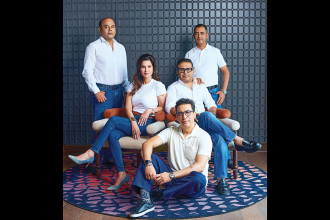
-1749018895.jpg)